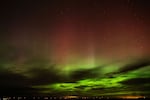
An aurora borealis, also known as the northern lights, is seen in the sky in the early morning hours of April 24, 2023, near Washtucna, Wash.
Ted S. Warren / AP
Local and national news outlets had suggested that Oregonians would have a chance Thursday to see an exceptionally large aurora borealis because of a massive solar storm.
The rare chance to see the Northern Lights in Oregon created a buzz on social media. Unfortunately, it almost certainly won’t happen.
Jim Todd, director at the Oregon Museum of Science and Industry, said the forecast changed, just like weather forecasts do.
“It turned out to be less than what was expected,” Todd said. “We see that sometimes. We say, ‘We’re going to get a big snowfall.’ And it turns out to be a trace.”
News stories about the lights were based on predictions by the University of Alaska’s aurora forecast. But the forecast was scaled back and activity on Thursday is now predicted to be low at best.
Oregonians may have a chance to see the celestial display in the future, however. Solar activity is expected to increase over the next few years as the sun goes through its usual solar cycle.
The aurora is usually seen around the magnetic poles of the northern and southern hemispheres. It is caused by particles streaming out of the sun and colliding with molecules in the Earth’s atmosphere.
